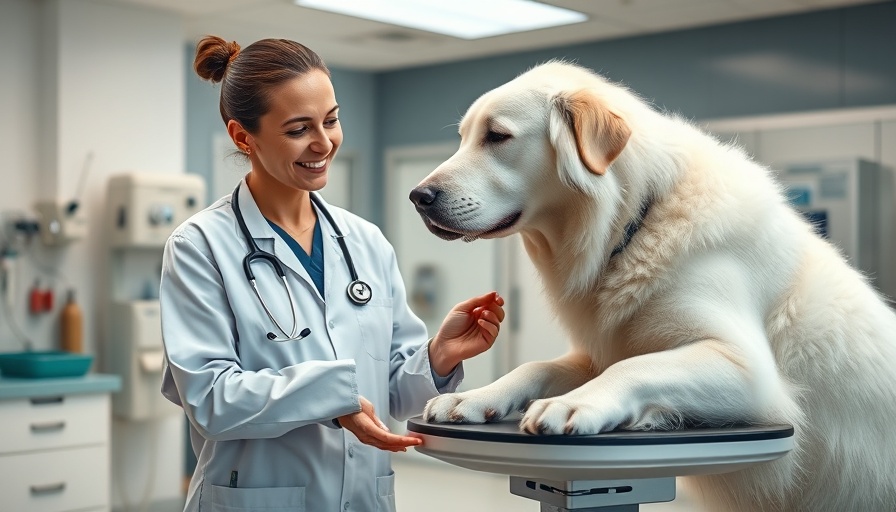
Understanding Canine Obesity: A Growing Concern
Dog obesity has silently crept into the lives of many pet owners, becoming one of the most prevalent health issues affecting our four-legged friends. According to veterinary studies, around 59% of dogs today are classified as overweight or obese. This alarming trend mirrors a broader societal issue concerning obesity in both humans and animals, necessitating a proactive approach to maintain a healthy and happy life for our pets.
The Role of Veterinary Guidance in Weight Management
When it comes to addressing your dog’s weight problem, veterinary advice is invaluable. Your veterinarian can provide tailored recommendations based on your dog's specific needs, including diet, exercise, and any underlying health conditions. As Dr. Leni Kaplan from Cornell University emphasizes, it's crucial to establish a weight loss target, aiming for a reduction of about 3-5% of your dog’s weight per month. This manageable goal can help mitigate risks linked to rapid weight loss while ensuring a steady improvement in health.
Choosing the Right Diet for Weight Loss
Selecting a veterinarian-approved diet is one of the most effective strategies for helping your dog reach and maintain a healthy weight. These weight-loss formulas, typically higher in fiber and lower in calories, can provide the essential nutrients your pet needs without excess calories. The choice of high-quality commercial diets greatly influences your dog’s weight management journey. Ensure to read labels carefully, verifying that the food meets the Association of American Feed Control Officials' standards.
For those who prefer to stick to their current dog food, Dr. Kaplan suggests reducing portions by about 10% while monitoring your pet’s weight. Incorporating low-calorie veggies like green beans or even adding water to meals can enhance fullness and hydration—subtle tweaks that can make a significant difference.
Portion Control: An Essential Strategy
It is not just the type of food but also the portion sizes that matter. Accurate measurement using a food scale or measuring cups can prevent those hidden calories that may contribute to weight gain. Moreover, don’t forget those seemingly harmless treats that might sneak into your dog’s daily calorie intake—many of which are calorie-dense. Instead, consider rewarding your pet with healthier alternatives like baby carrots or celery sticks.
Enhancing Exercise: Making it Fun!
No weight management plan is complete without regular physical activity. Dogs need daily exercise to help burn calories, improve cardiovascular health, and promote overall well-being. Increasing your dog’s activity level does not have to be daunting; simply extending walks by 10% weekly or incorporating playtime can achieve great results.
Moreover, engaging your dog in interactive games can provide both mental stimulation and physical activity. Activities like fetch or agility training can turn exercise into playtime, enhancing your dog's quality of life while supporting weight loss efforts.
Understanding the Health Risks of Obesity
If your dog is overweight, understanding the implications is crucial for motivation and effective management. Excess weight can lead to serious health issues including diabetes, joint problems, heart disease, and even reduced lifespan, as noted by studies from the University of Liverpool. Providing the right information and guidance helps pet owners make informed decisions about their dog's health, allowing them to take preventive action against these risks.
Furthermore, certain breeds have a genetic predisposition to obesity, putting them at heightened risk. Owners of breeds like Pugs or Beagles should be especially mindful of their dog's diet and exercise routine to combat this tendency.
Patience and Consistency: The Keys to Success
It’s essential to acknowledge that weight loss in dogs is a gradual process, requiring patience and consistency from pet owners. As you embark on this journey, resist the temptation to overindulge your dog and focus on establishing lifelong healthy habits. Engage in regular follow-ups with your veterinarian for guidance and to adjust the diet and exercise plans as your dog progresses.
Join the Fight Against Dog Obesity
Your commitment to understanding and addressing your dog's weight challenges makes a significant difference in their health and happiness. So let's take the first steps together towards a healthier lifestyle for our furry companions. Consult with your veterinarian today to devise a personalized weight management plan!
 Add Row
Add Row  Add
Add 


 Add Row
Add Row  Add
Add 

Write A Comment